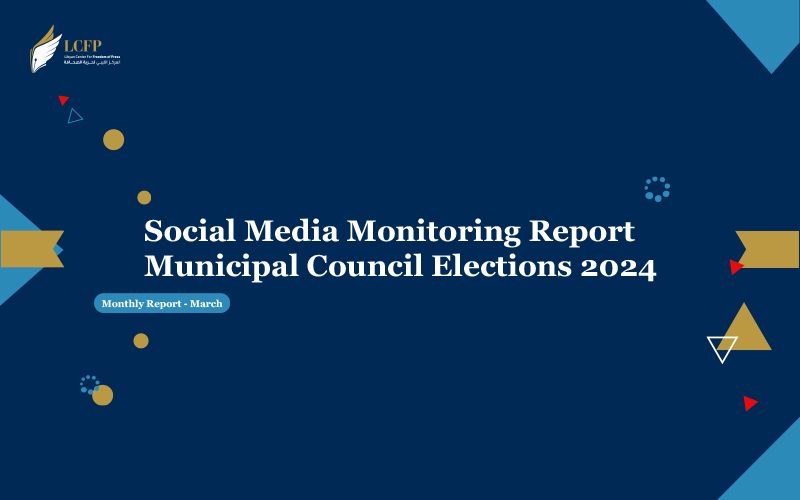
Monitoring social media around municipal council elections (March)
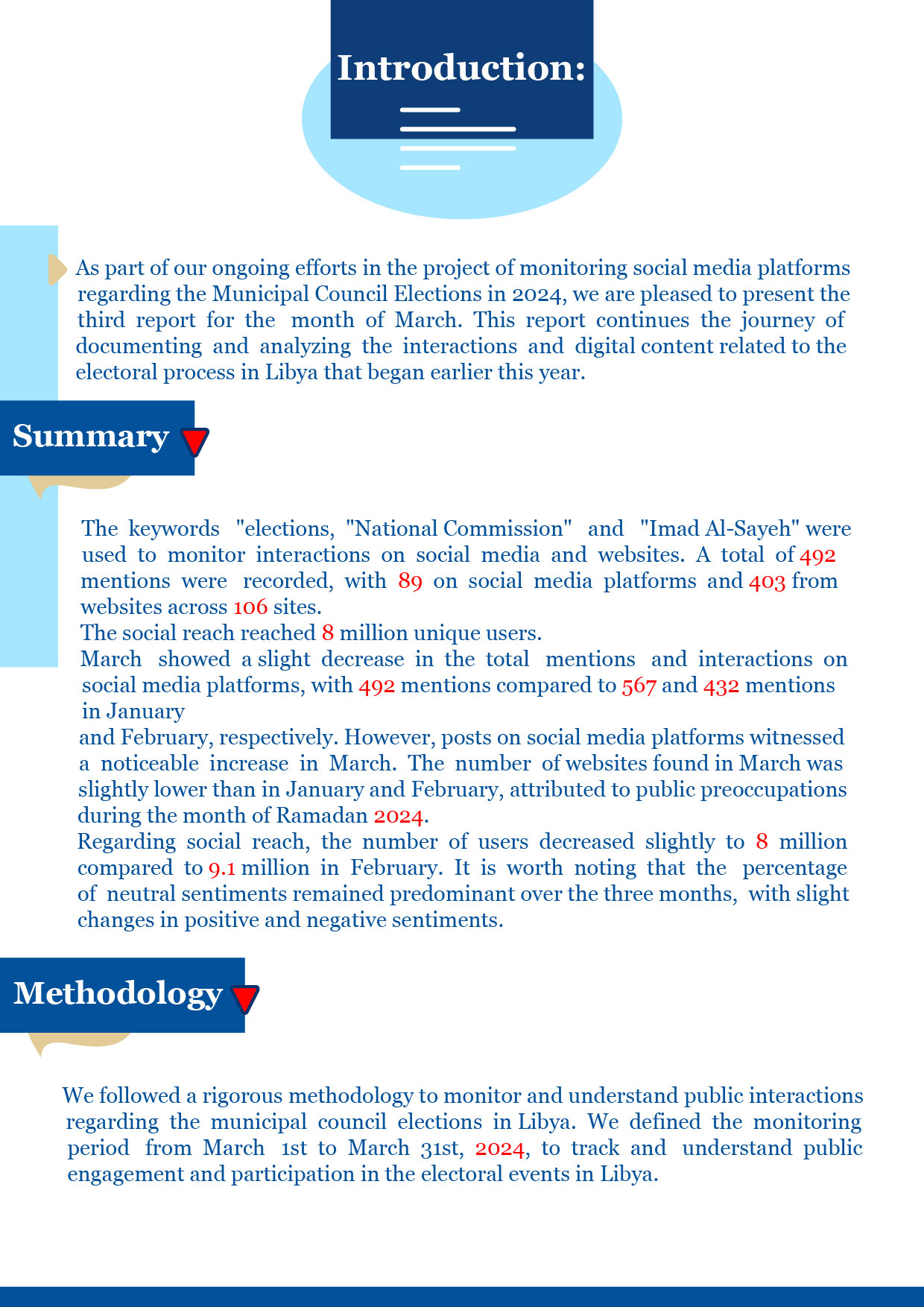
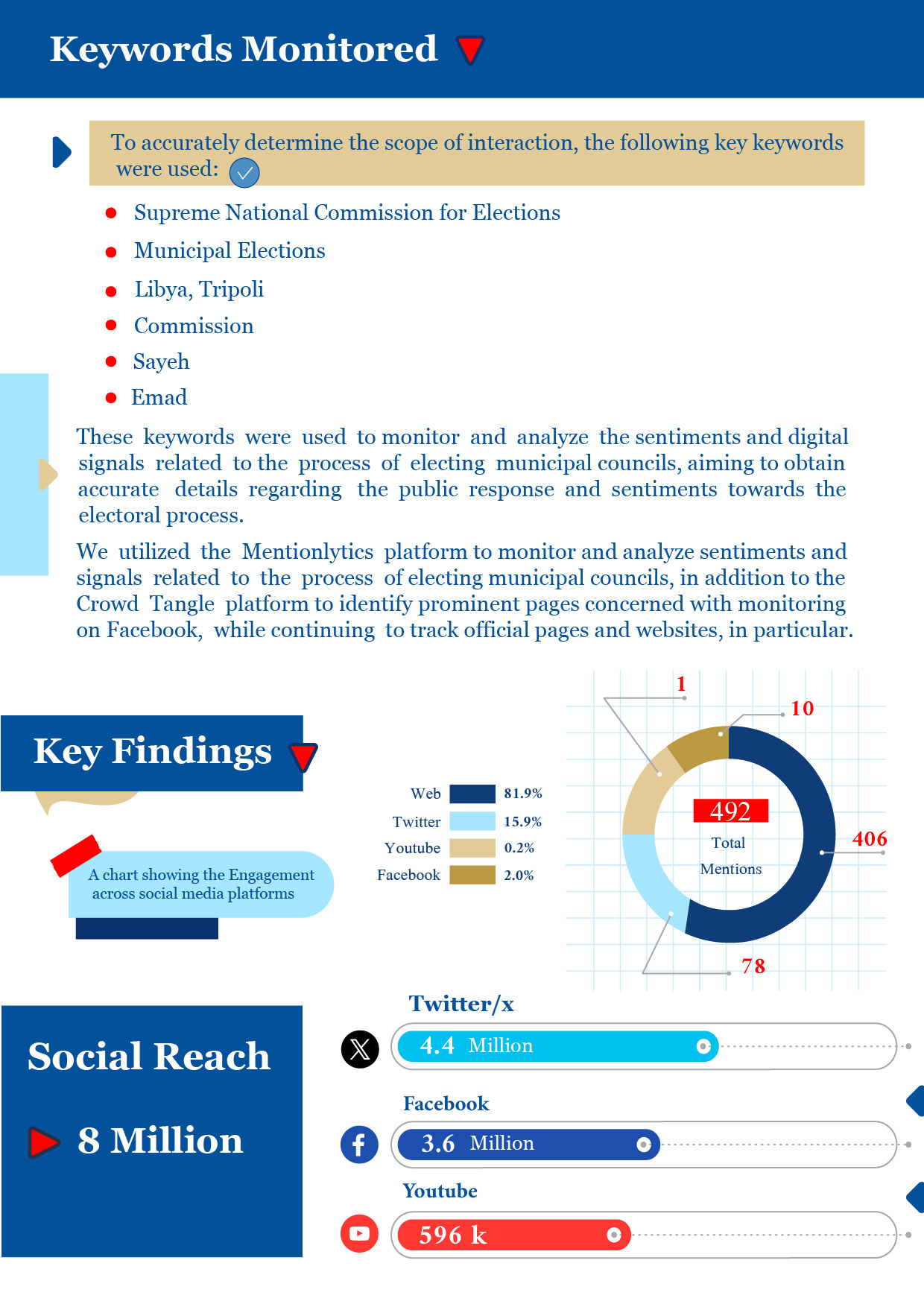
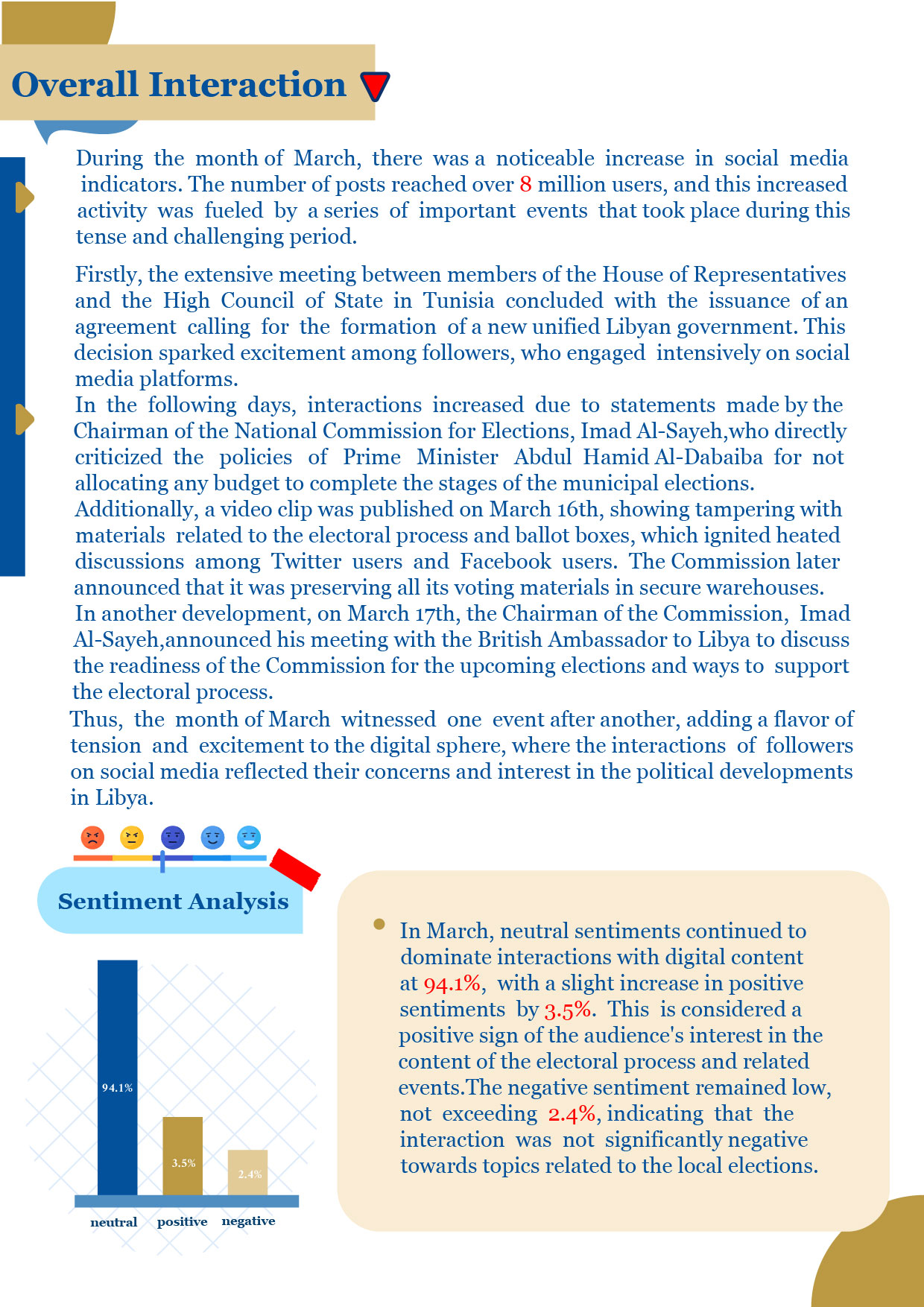
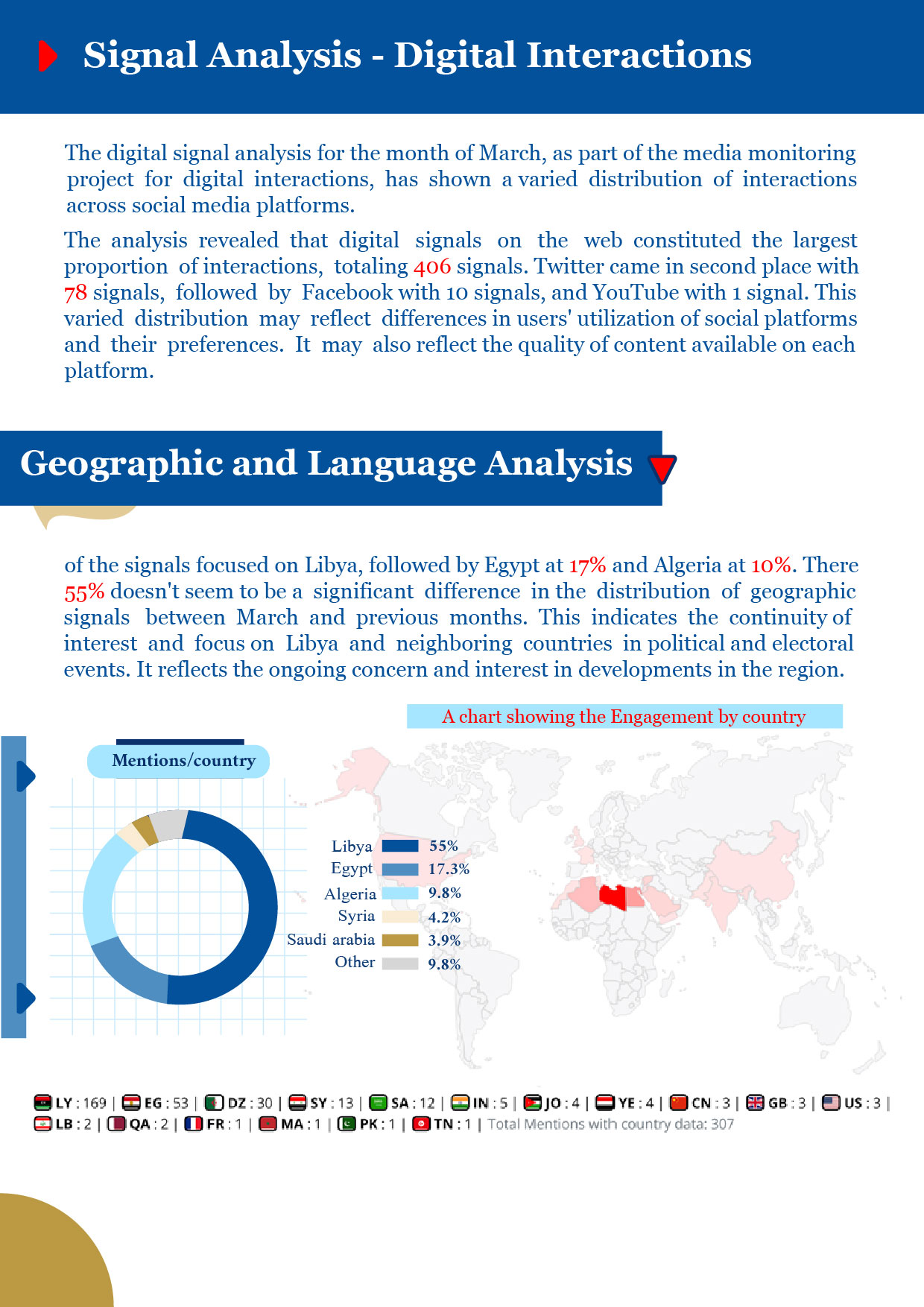
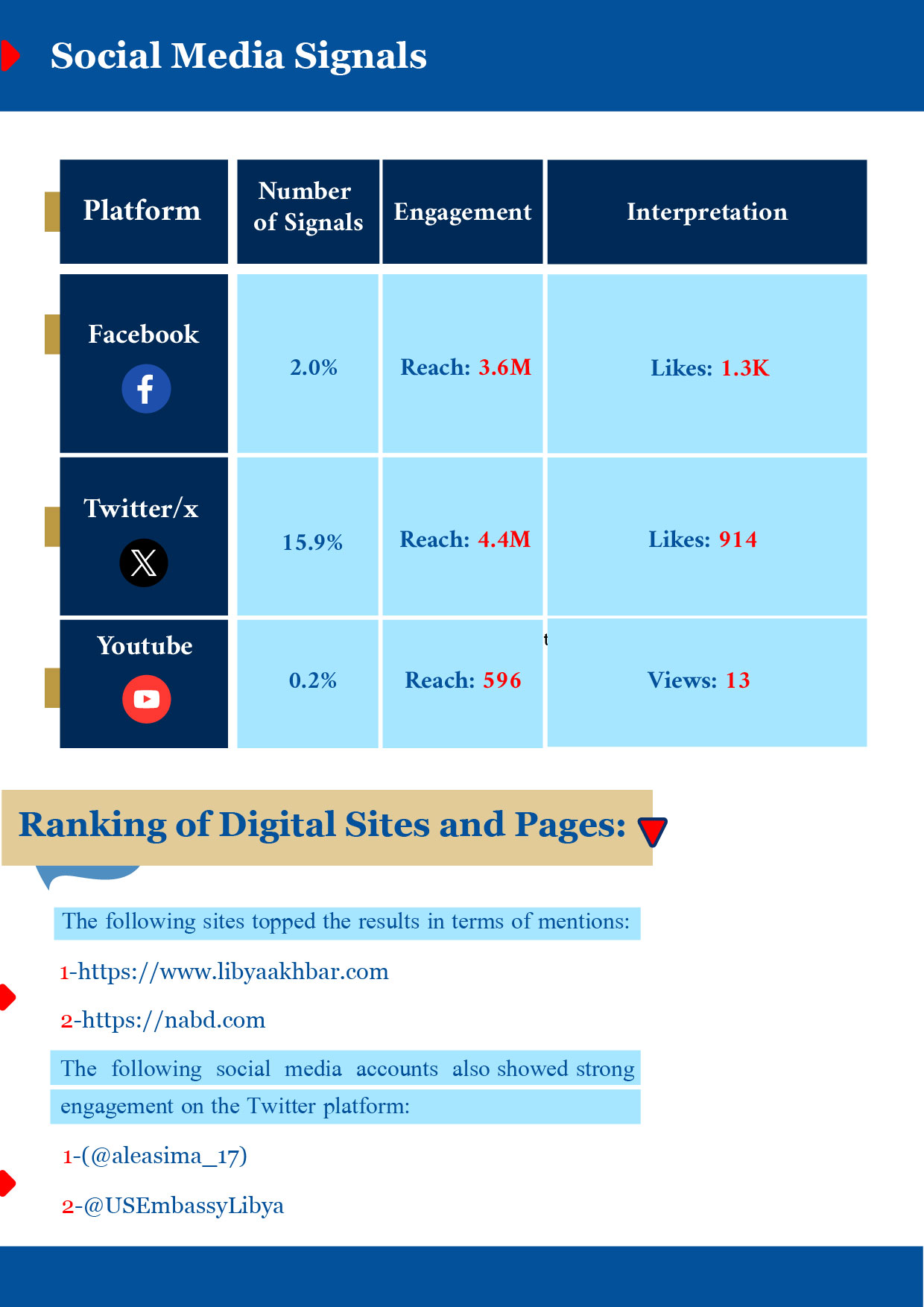
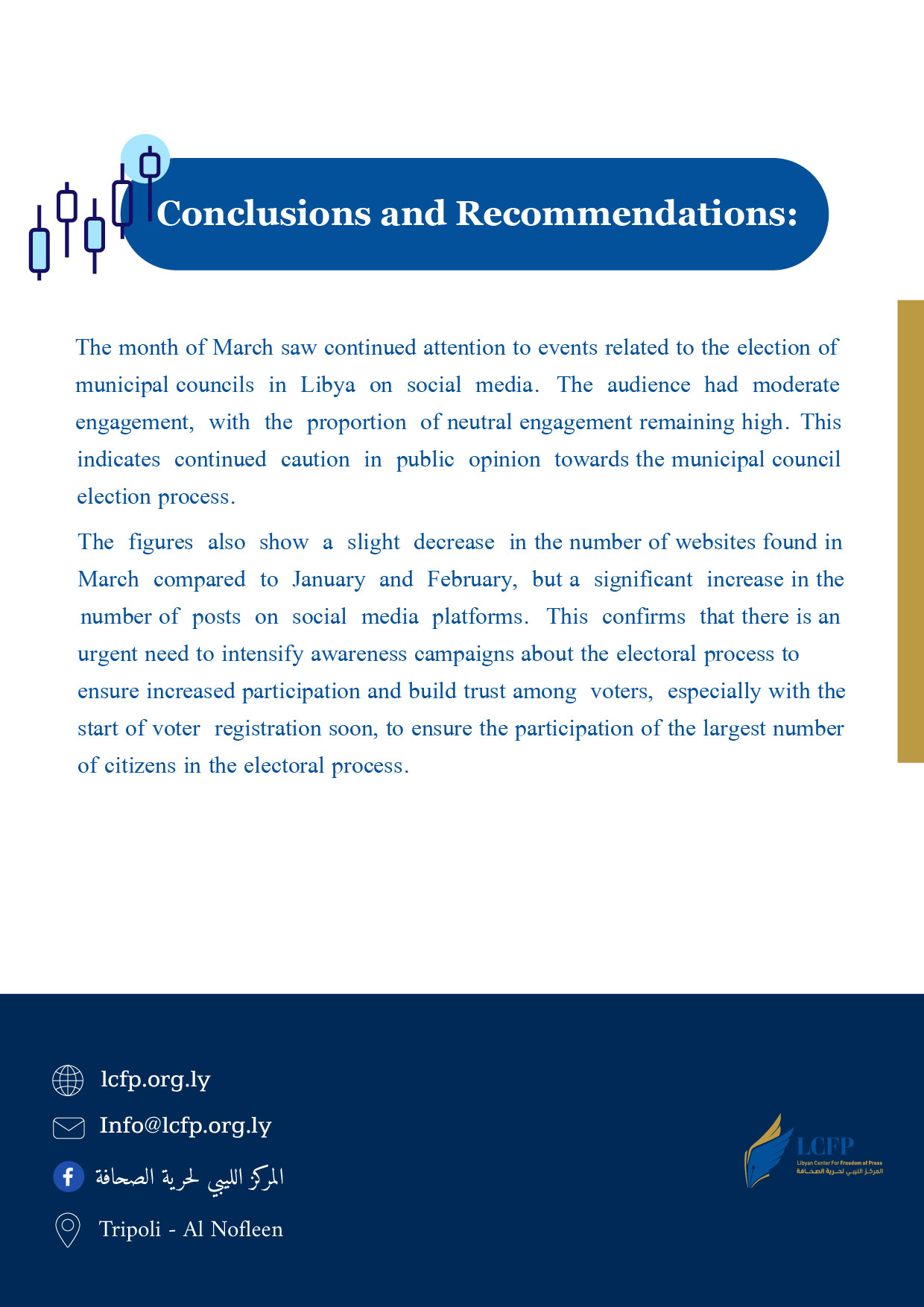







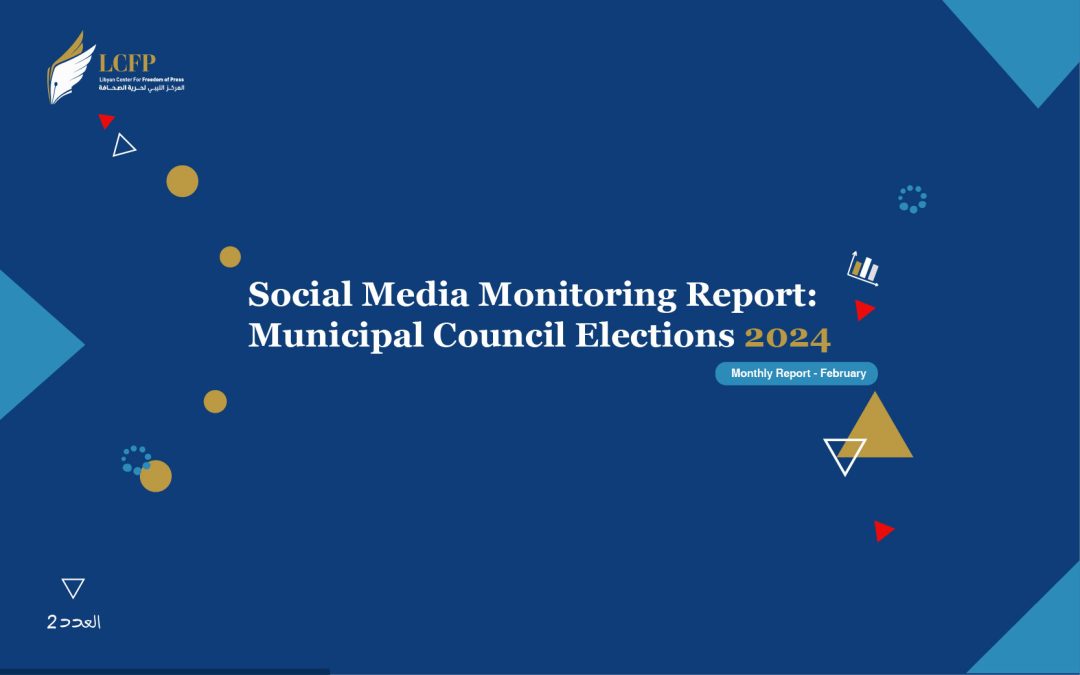
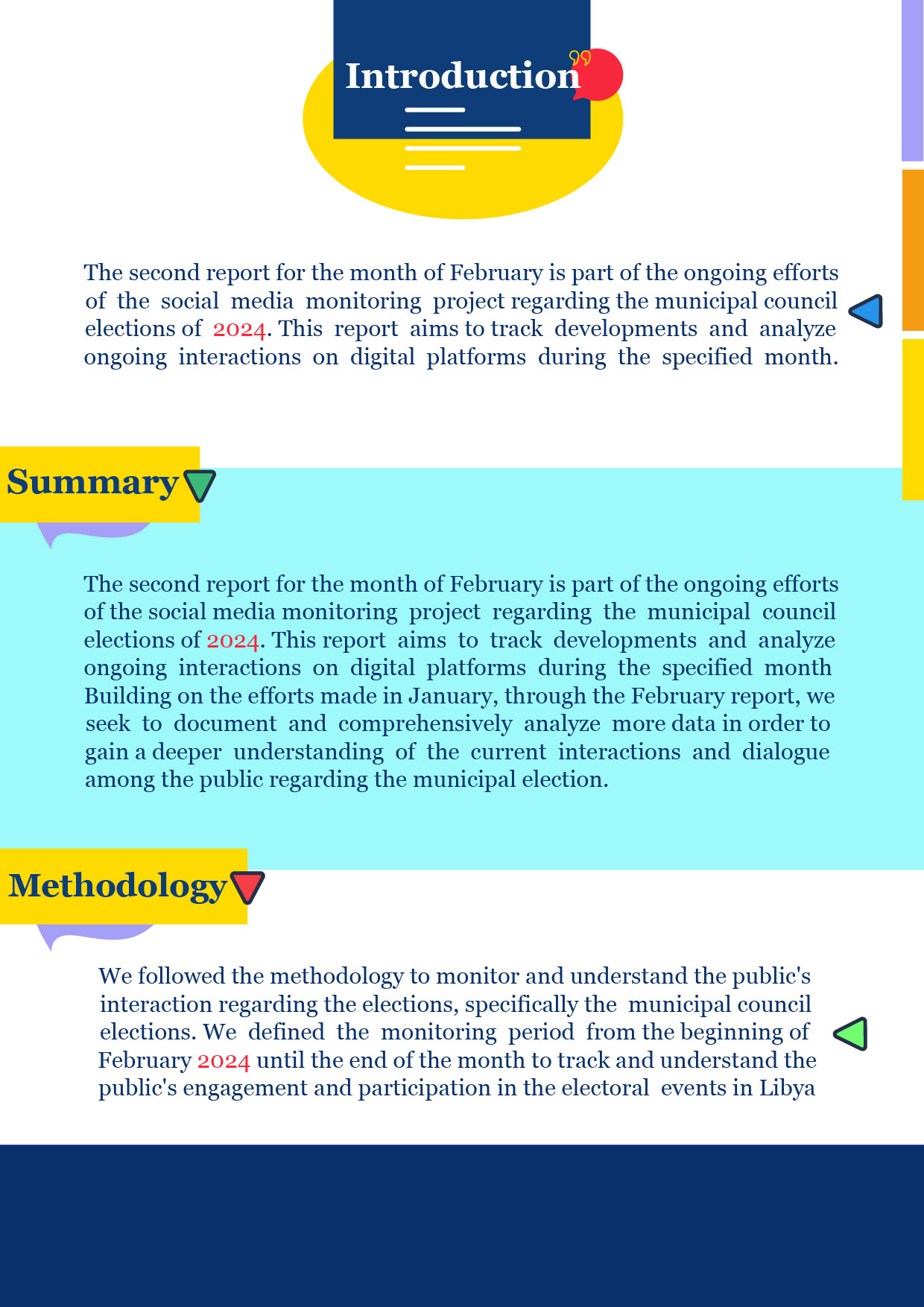
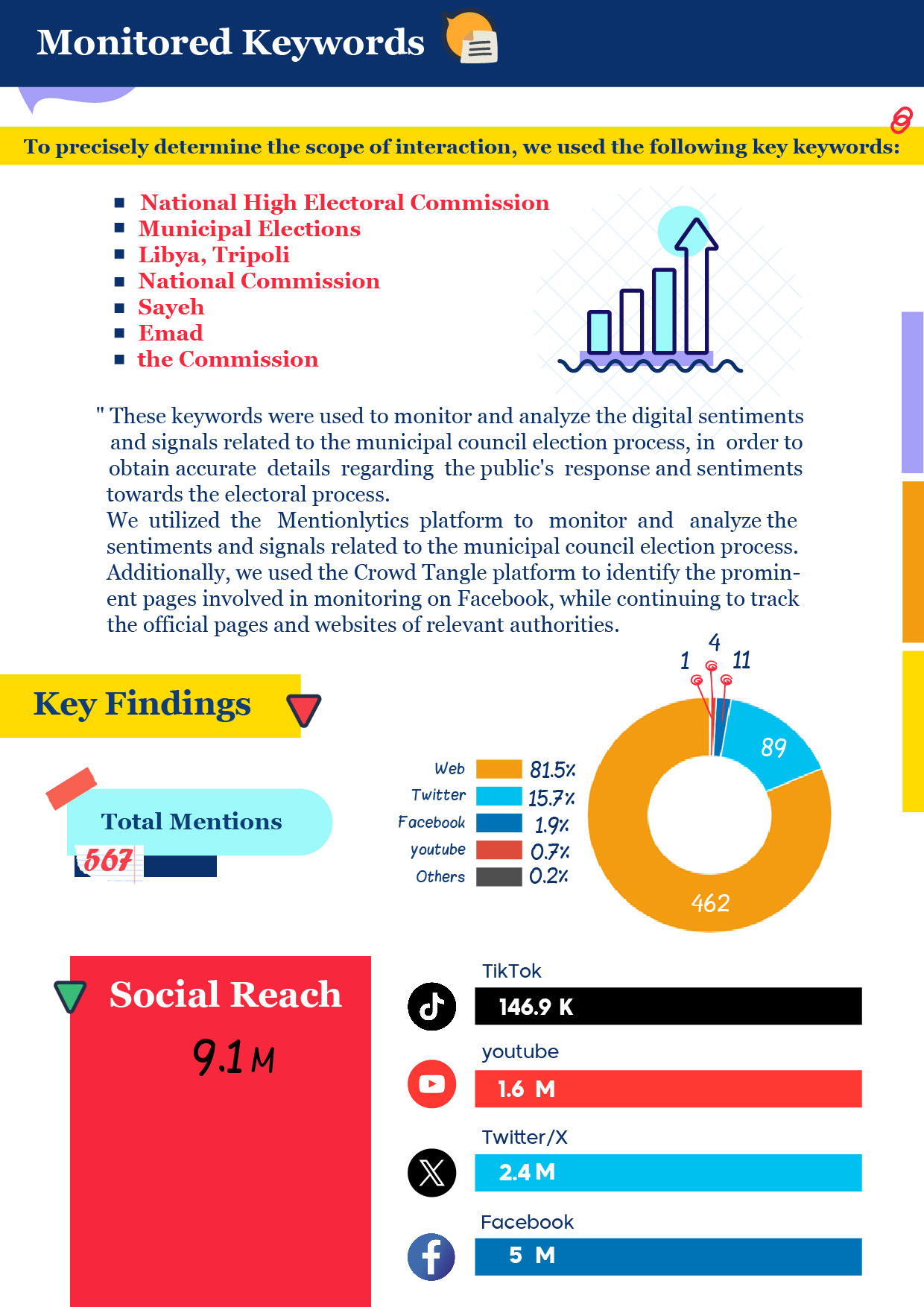
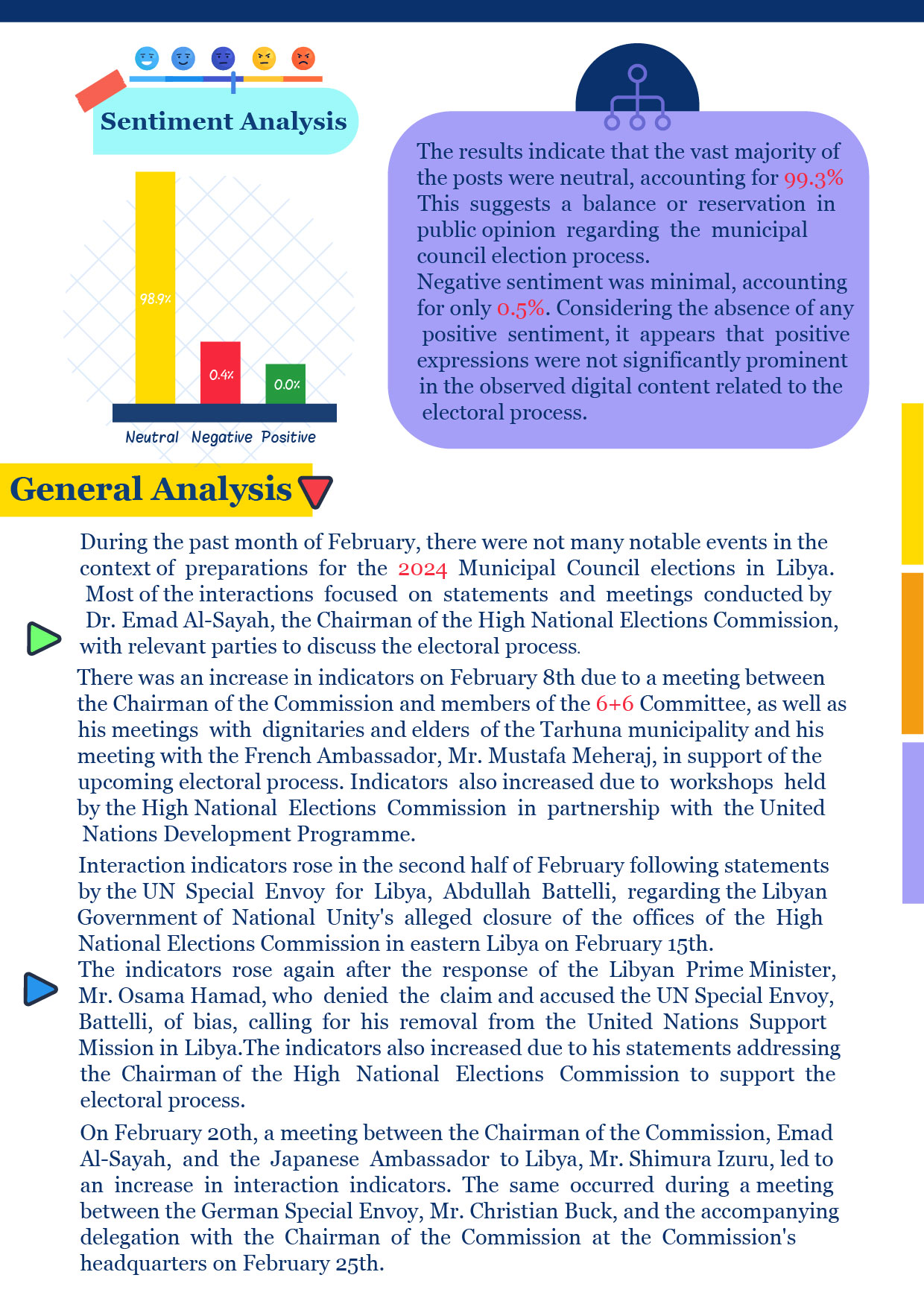
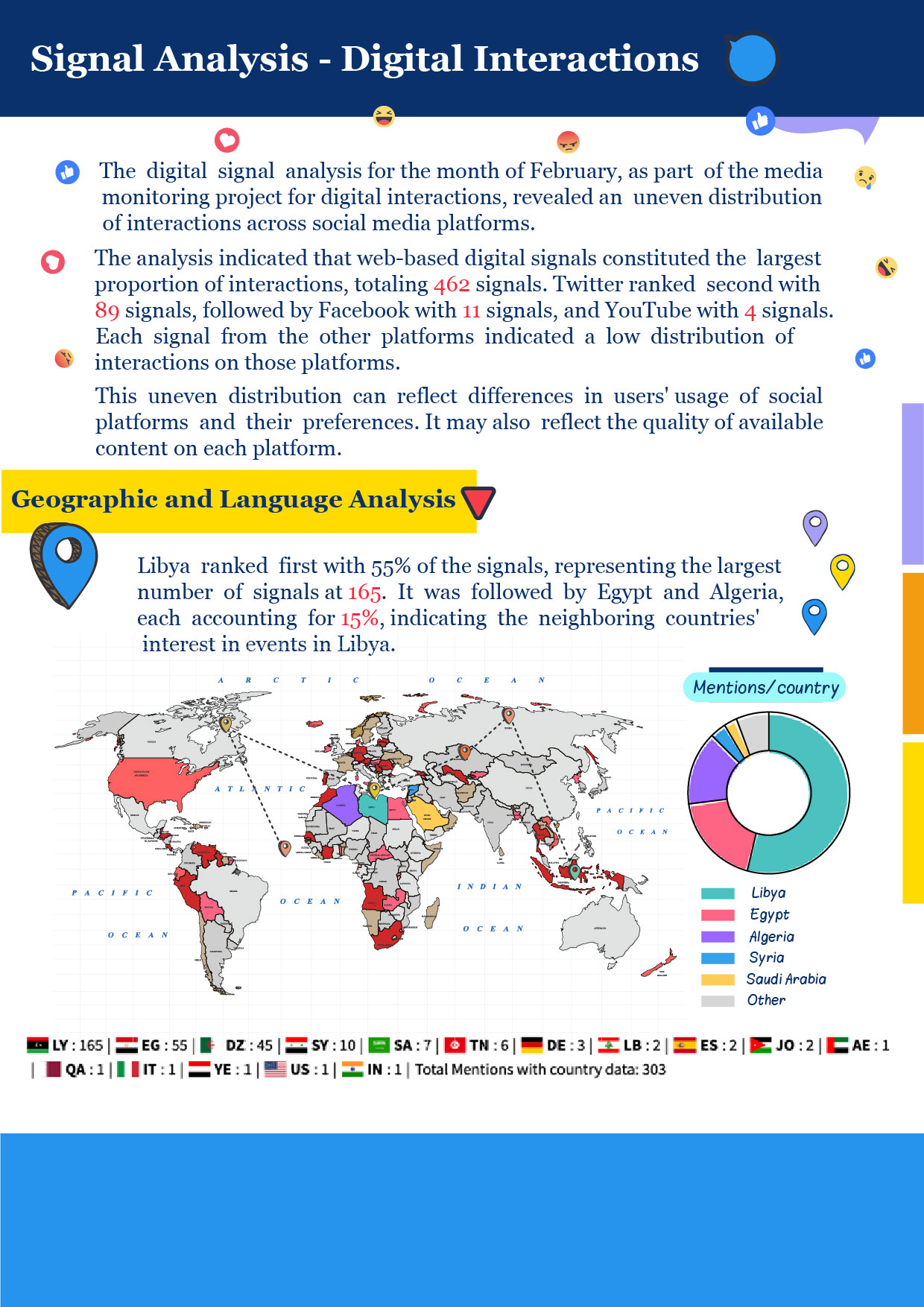
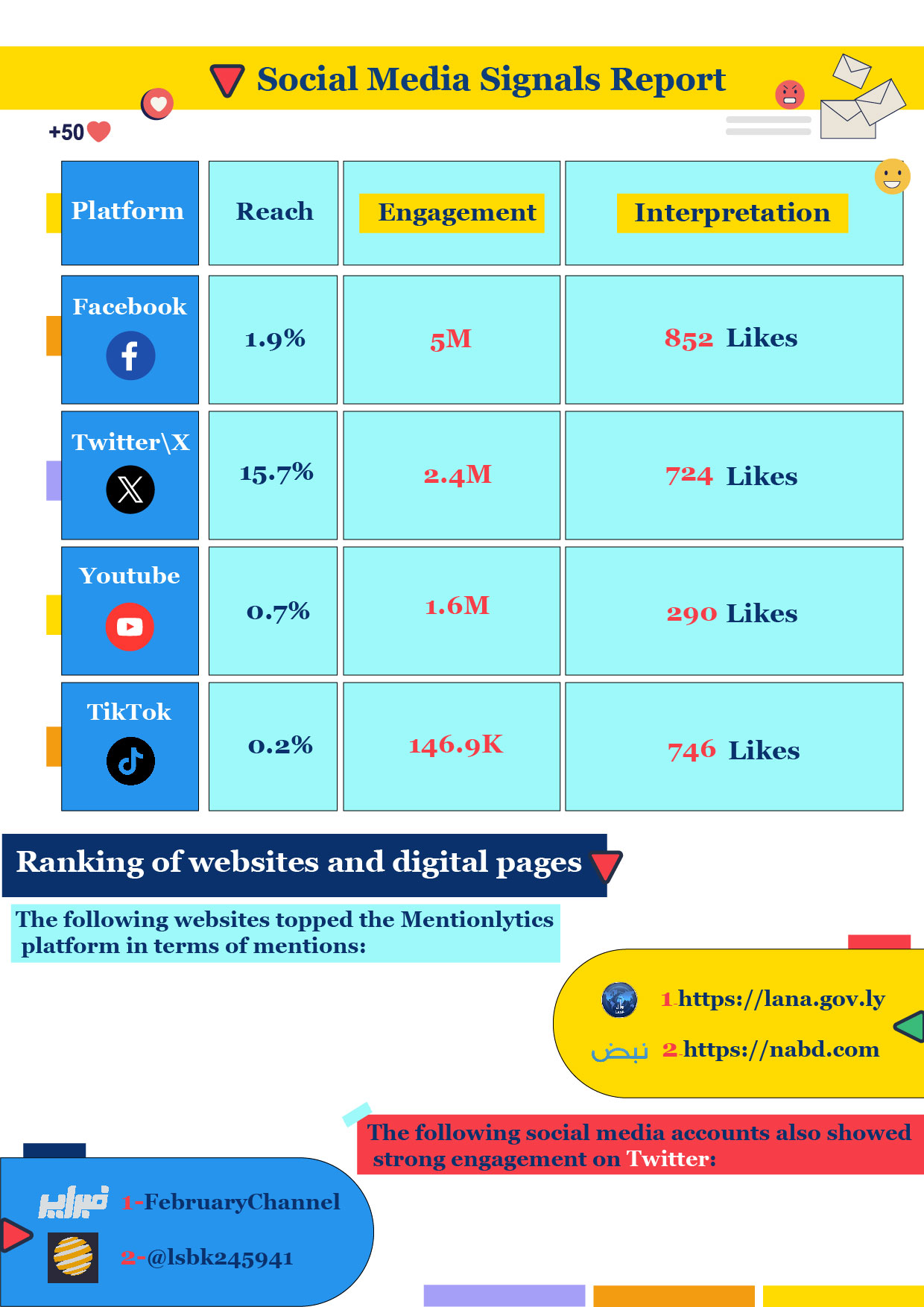
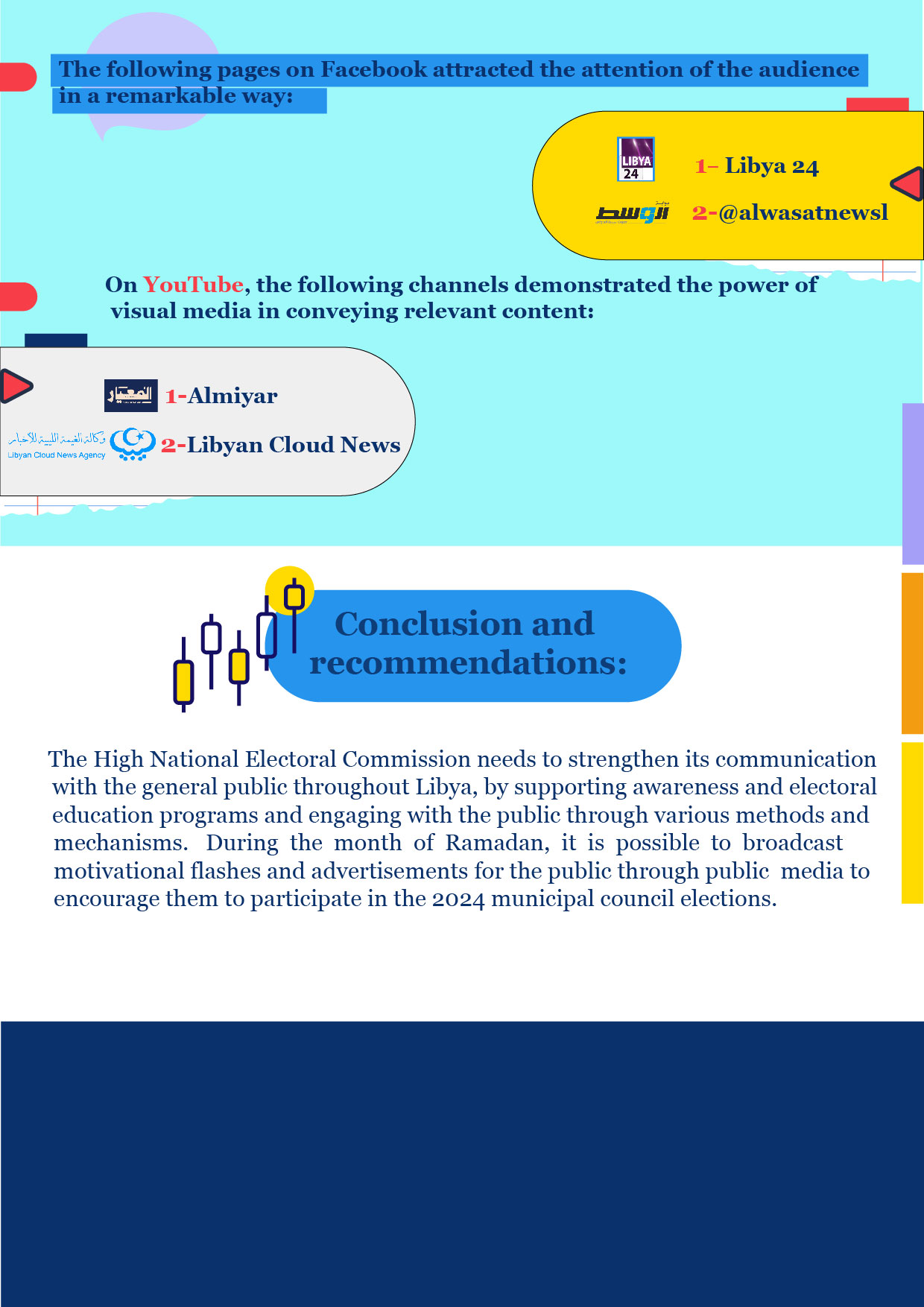
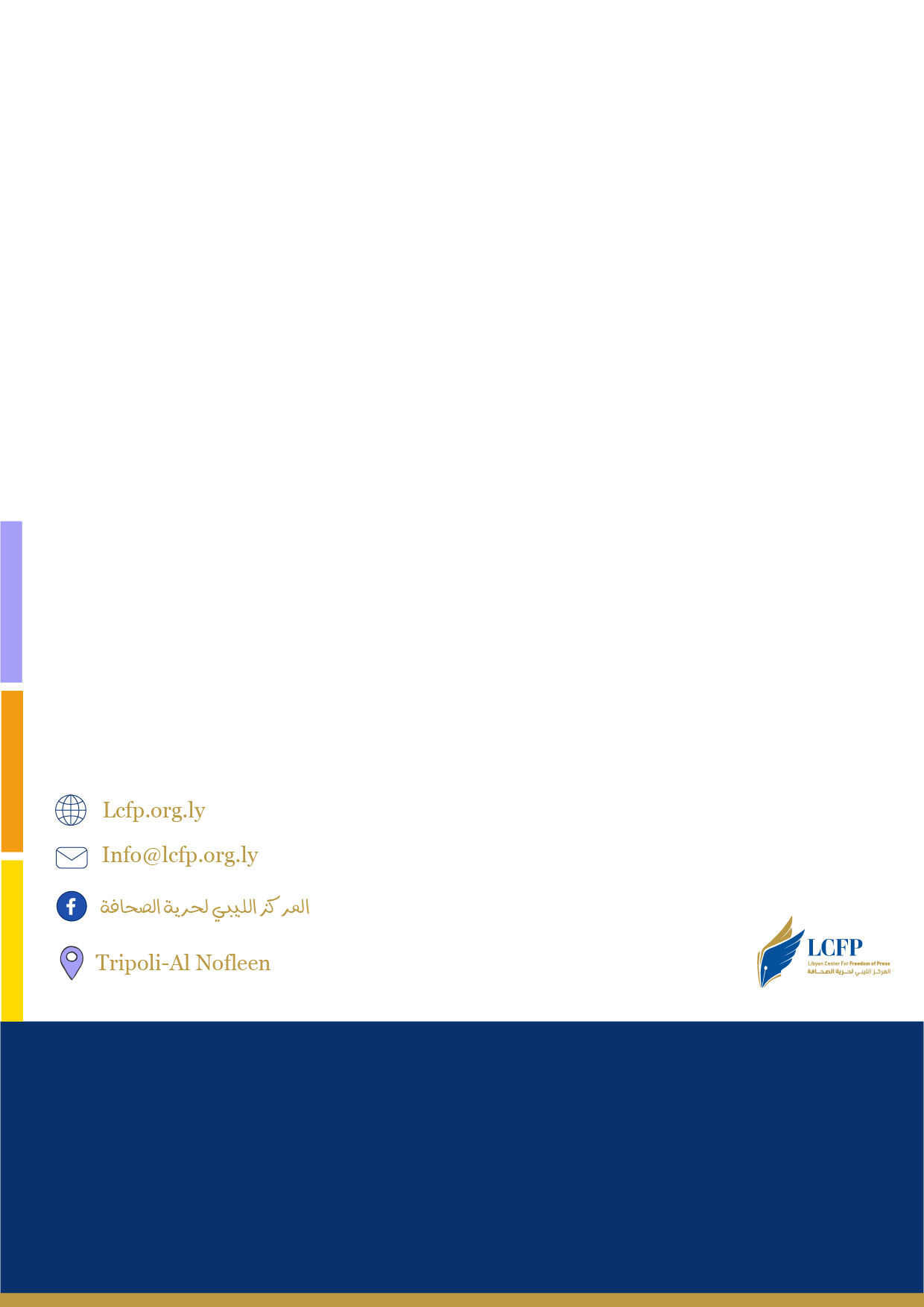
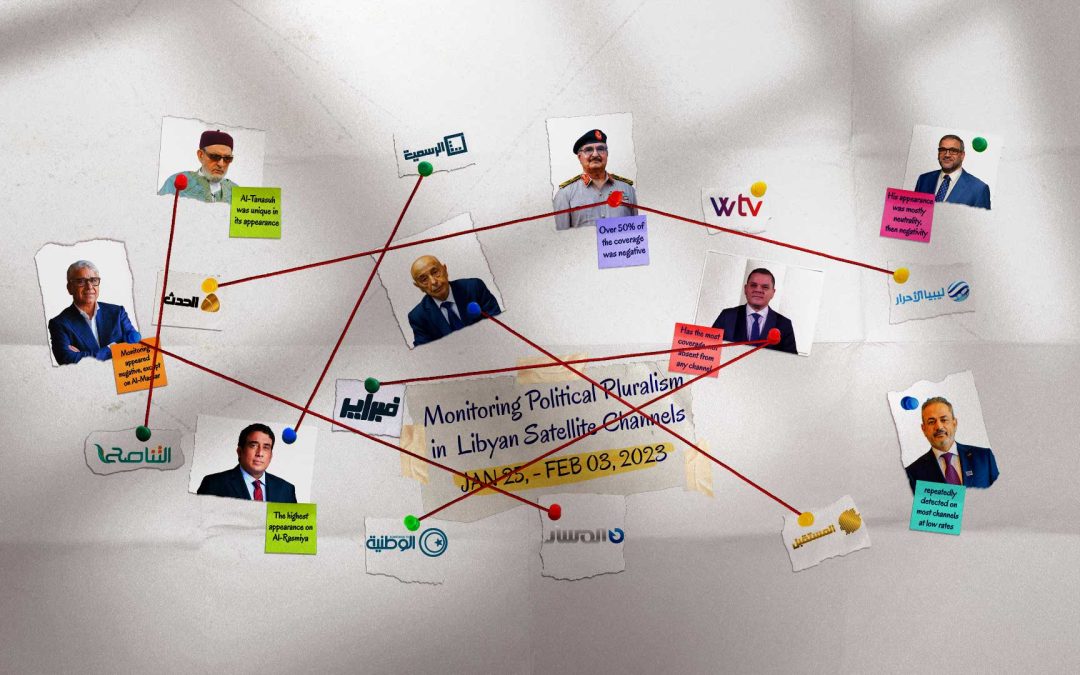
Tripoli, Monday, September 4: The Libyan Center for Freedom of Press (LCFP) issued a new research report, the first of its kind in the Libyan context, on “political pluralism in Libyan satellite channels” in preparation for the national elections. The research report is launched in partnership with MENA Media Monitor .
The new research report focuses on monitoring and analyzing the content of 9 of the most followed and influential Libyan satellite channels that address political issues and public affairs in their programs. We have monitored 450 hours of live television broadcast. Our observation was focusing on 6 prominent political figures.
The research report concluded that the concepts of professional balance and political pluralism are lacking in most of the targeted media outlets in their coverage of the complex political events in the country. The majority of these channels lean towards the political propaganda of certain people and their political orientations.
The February and Al-Masar TV channels took over 41% of the total media coverage and appearence of political figures in the Libyan media scene. The Prime Minister Abdul Hamid Dbeibeh, General Khalifa Haftar, leader of the House of Representatives Aguila Saleh, former President of the High Council of State Khaled Al-Mishri, and President of the National Oil Company Farhat bin Qadara appear the most in the content that was monitored in the Project during the monitoring period.
The results of the monitoring operations show that the Prime Minister of the Government of National Unity received a coverage with a positive trend of 35%. Then, the commander of the armed forces in the east of Libya, Khalifa Haftar, received a positive coverage trend of 28%. After that, comes the former head of the parallel Libyan government, Fathi Bashagha, with a rate of 26%. As for negative coverage, we find General Khalifa Haftar at a rate of 53%, followed by Fathi Bashagha at a rate of 44%, and then the president of the House of Representatives, Aguila Saleh, at a rate of 43%.
Despite the wide presence of the Prime Minister in media, it was negative. For instance, he received 25% of the media coverage of Al-Masar TV channel, yet, with a negative trend of 82%. The former Presidents of the House of Representatives and the High Council of State, on the other hand, have been covered at a rate of 17% each, with a negative trend of 55% for Aguila Saleh, and 26% for Khaled Al-Mashri.
The Prime Minister of the Government of National Unity, Abdul Hamid Dbeibeh, topped the list of the highest appearing figures in Libyan media by more than 24% of the monitored content. In February channel, which he is believed to own, he receives a 44% coverage with a positive and neutral trend of 91%. On the other hand, the appearence of General Khalifa Haftar and the president of the House of Representatives, Aguila Saleh, is around 21% each with a negative trend of more than 90%. This means that February channel has shifted from media service to political propaganda in favor of one political figure.
General Khalifa Haftar obtained 25% of the total coverage of the Libya Al-Hadath TV channel, which is owned and managed by one of his sons. This coverage was generally positive by 89%. The General is also the first politician covered by Libya Al-Ahrar TV channel by 23%. However, the trend is negative with 59%. The results of the monitoring operations show that the coverage of the Libya Al-Hadath channel is blatantly biased towards Haftar compared to the rest of the political figures.
The Chairman of the House of Representatives, Aguila Saleh, also dominates the coverage of Libya Al-Mustaqbal TV channel by 26%. The channel is affiliated with the Presidency of the House of Representatives. This coverage was positive by 71%, while Prime Minister Abdul Hamid Dbeibeh appeared in 13% of the covered materials, but with a negative trend of 80%.
However, what is interesting is the diversity in the coverage of a large number of political figures in Al-Wasat TV channel. Despite the fact that the Prime Minister leads the coverage by 20%, Al-Wasat channel does not show any blatant bias towards any of the political actors in Libya. The coverage trend is more neutral or negative than it is positive.
It is evident that Libya’s Grand Mufti, Sheikh Sadiq al-Ghariani, obtains an 89% positive trend in Al-Al-Tanasuh TV channel, since it is affiliated with Dar al-Ifta. General Khalifa Haftar appears in the channel with an absolute negative trend of 76%. Aguila Saleh and Abdul Hamid Dbeibeh obtained an equal coverage of 14% in Al-Al-Tanasuh TV channel. However, that coverage is negative for Aguila Saleh and ranges between positive to neutral for Abdul Hamid Dbeibeh.
The research report shows the absence of the concept of political pluralism in public media, namely Al-Rasmia and Al-WatanyaTV channels. Their role is limited to being the first communication institutions of the Presidential Council and Government of National Unity. In addition, 97% of the political figures monitored in satellite channels are over the age of fifty years. Moreover, while men accounted for 94% of the coverage in the Libyan monitored channels, women are absent from the political media scene.
Due to the important and sensitive role played by Libyan media, and to the influence of the intervening and controlling political figures, LCFP continues to work in conducting more media research and studies to understand the Libyan media problems and challenges. Through this, LCFP attempts to implement the concept of self-regulation, and to develop a tool that measures the professional balance in media coverage in order to ensure fair representation and equal opportunities among candidates in the stalled upcoming national elections.
Many executive institutions in the media sector have been established. They start without a clear strategic vision for their mission and tasks, especially under the legislative gap, the absence of media laws and the lack of the right to access information. On the other hand, satellite channels and digital platforms play an important, but negative, role in the Libyan crisis.
The research report shows the urgent need to install a pluralistic media scene that ensures fair representation of all political parties. That is a necessity in order to organize free national elections that guarantee the right of both voters and candidates. The report focuses on knowing the extent to which Libyan politicians appear in the media scene, and does not aim at defaming or undermining the efforts of newsrooms.
Download the report via the following link :
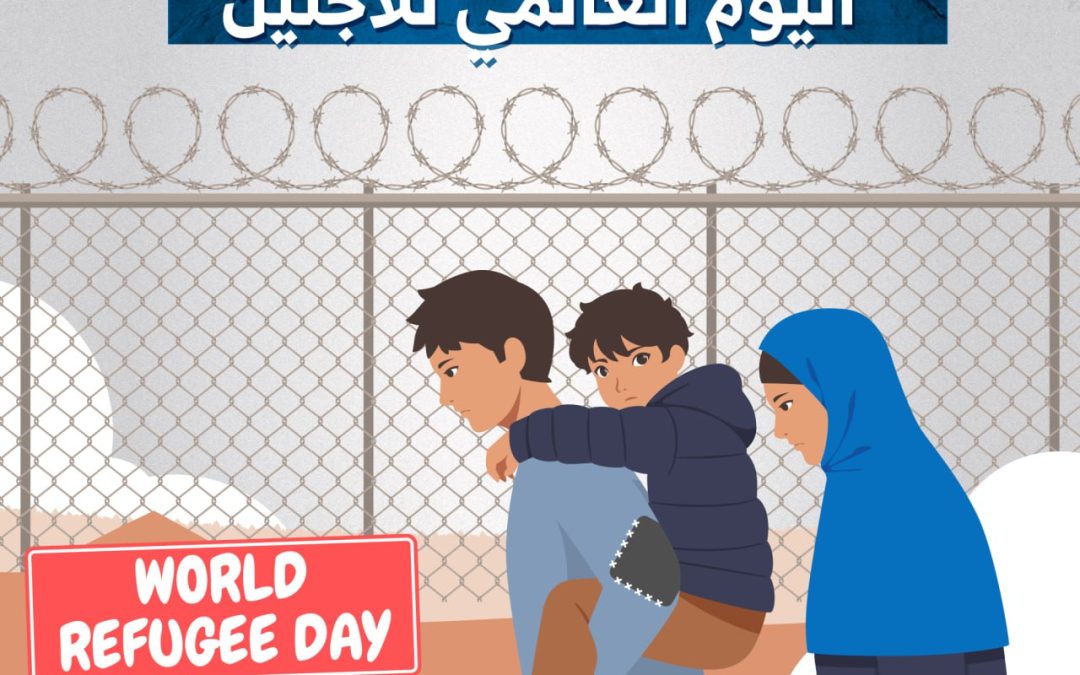
On World Refugee Day[1]
Libyan Authorities arbitrarily detain Hundreds of Refugees[2] and Asylum Seekers in Inhumane Conditions
Circumstances forced millions of people to leave their original homelands and flee in search of a safe place, to resume their lives anew, and in this perilous journey many of them lose their lives, and many of them are subjected to ill-treatment, humiliation, extortion and sexual violence. June 20 marks World Refugee Day to remind us of their suffering in the world in general and Libya in particular.
This day passes on refugees in Libya as one of the most painful days, where this year began with campaigns of arrests, arbitrary in their targets, shocking in their results. The security authorities in the east, west and south of the country launched arrest campaigns described as violent and undisciplined. The campaigns targeted a thousand refugees and asylum seekers, as well as migrants who entered through official border crossings, and children and women were not spared from those campaigns. International organizations and agencies, including the United Nations Support Mission in Libya (UNSMIL), condemned the campaign and called on the Libyan authorities to stop these measures and treat migrants with dignity and humanity in line with Libya’s international obligations. It also called on the Libyan authorities to grant United Nations agencies and international non-governmental organizations unhindered access to detainees who need urgent protection[3].
Libya has not ratified the 1951 Convention relating to the Status of Refugees[4], nor its 1967 Protocol, but it has joined the African Convention governing the different aspects of refugee problems in Africa[5], as well as many conventions on maritime rescue and the Convention on the Rights of the Child, which provide for the protection of asylum seekers and provide a safe place for them and connect them with the agencies that work to provide protection for them. Despite all these obligations, the Libyan legislator remained rigid in its place, as legislations were not amended, nor were any laws enacted that are consistent with those obligations. Libya still criminalizes illegal entry across borders into Libya, including refugees and asylum seekers[6], and they are detained and considered all “illegal” migrants.
According to estimates by the International Panel of Experts on Libya[7], established by Security Council resolution 1973 of 2011, there are 24 government detention centers in Libya for detaining migrants and asylum seekers. And according to estimates by the United Nations High Commissioner for Refugees (UNHCR), there are about 4,500 people detained in Libyan detention centers controlled by the Department for Combating Illegal Migration (DCIM), of whom 2,500 are of concern to UNHCR, and that the total number of refugees and asylum seekers in Libya is 42,559 individuals, who are scattered across various areas in Libya[8]. UNHCR is mostly unable to communicate directly with them, and many services are provided by phone or through local and international organizations that are partners of UNHCR.
Asylum seekers and refugees complain of the negligence of UNHCR staff in communicating with them and providing assistance to them. The Libyan authorities practice of obstructing UNHCR’s work is exacerbating the crisis of refugees and asylum seekers. UNHCR is not allowed to register asylum seekers in several areas, including eastern and southern Libya. This forces asylum seekers to travel to the capital Tripoli just for registration, which exposes them to risks on the way and harassment by outlaws, and sometimes detention because they do not have identification papers.
The situation of migrants and asylum seekers in Libya is always politicized on the one hand, and neglect on the other hand. The UNHCR and the countries that are supposed to be the first host are accused of not being serious in creating realistic and urgent solutions to get the stranded asylum seekers out of Libya and transfer them to countries, where they will be safer and protected.
World Refugee Day is a day designated by the United Nations to remind of the rights and obligations of asylum seekers and refugees, and to remind the world that the decision to seek asylum is not a choice, but a compulsion, due to compelling circumstances that required risking and requesting protection. Accordingly, the organizations signing this statement issued the following recommendations:
Libyan Authorities
United Nations Mission and International Organizations Operating in Libya
Refugees and Asylum Seekers:
Tripoli – Libya
June 20, 2023
[1] On the fiftieth anniversary of the 1951 Convention relating to the Status of Refugees, which defines the basic concepts of international protection for refugees, the United Nations General Assembly, at its fifty-fifth session, decided to designate June 20 of each year as “World Refugee Day”, General Assembly resolution No. (A/RES/55/76) dated December 4, 2000.
[2] A refugee is someone who fled his or her home and country owing to “a well-founded fear of persecution because of his/her race, religion, nationality, membership in a particular social group, or political opinion”, according to the United Nations 1951 Refugee Convention. Many refugees are in exile to escape the effects of natural or human-made disasters.
[3] United Nations Support Mission in Libya (UNSMIL): “Statement on the arbitrary mass detention of migrants and asylum seekers that affected all parts of the country”, June 12, 2023.
[4] United Nations High Commissioner for Human Rights: “Convention relating to the Status of Refugees”, 1951.
[5] African Union: “OAU Convention Governing the Specific Aspects of Refugee Problems in Africa”, 1974
[6] Asylum seekers: Asylum seekers say they are refugees and have fled their homes as refugees do, but their claim to refugee status is not yet definitively evaluated in the country to which they fled.
[7] UN Security Council: “Final report of the Panel of Experts on Libya submitted in accordance with resolution 2571 (2021)”, May 27, 2022.
[8] UNHCR: “UNHCR Libya Update 06 June 2023”.
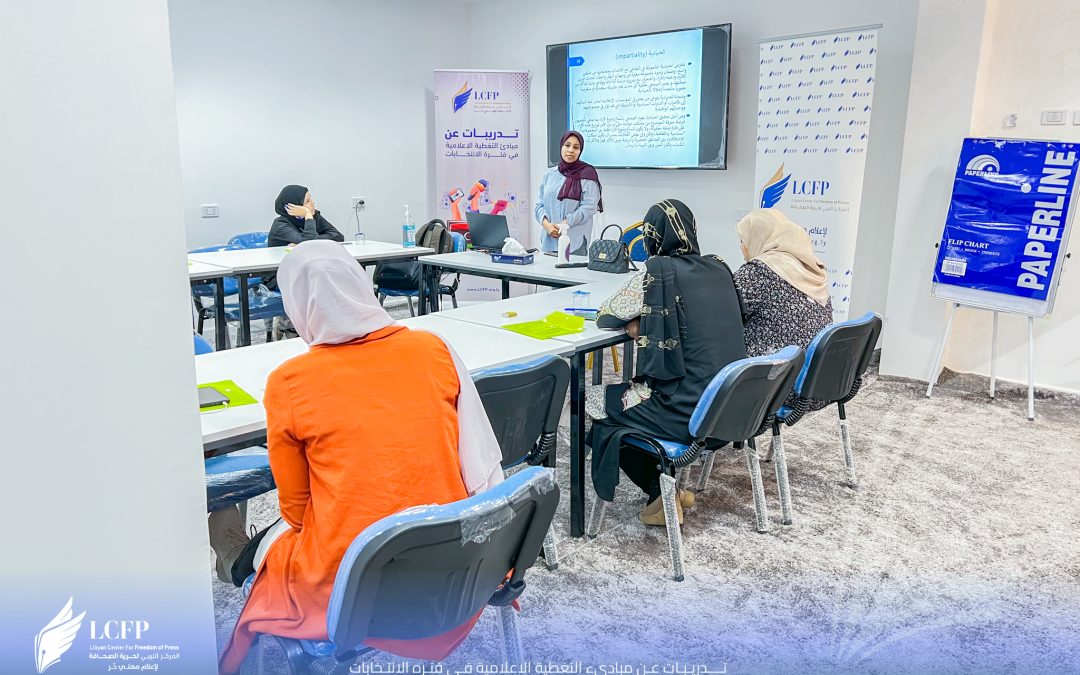
Sebha, June 13
Journalists and activists participated in a workshop on the guidelines for media coverage of the national general elections on Saturday and Sunday in Sebha, with the participation of 12 journalists, activists and bloggers working in many media outlets
The workshop focused on how to collect and analyze information from electoral constituencies and polling stations. It also shed light on the role of journalist in monitoring and covering all aspects of the electoral process. The workshop was an opportunity to do simulations of drafting news reports related to the coverage of aspects of electoral campaigns and the polling day
The workshop also tackled the basic roles of media in the context of elections, how to prepare for press interviews, and how to conduct balanced coverage of all actors in the electoral process. Executive regulations and electoral laws related to the presidential and legislative elections were introduced to journalists in the workshop
Participants stressed the need to intensify awareness-raising and training campaigns for local journalists, to ensure access to information on all aspects of the electoral process and to activate the role of the Media Centre of the High National Electoral Commission
It is noteworthy that the workshop comes within the initiative of media coverage of the national elections with the aim of training about 140 Libyan journalists on professional rules for media coverage during the national elections